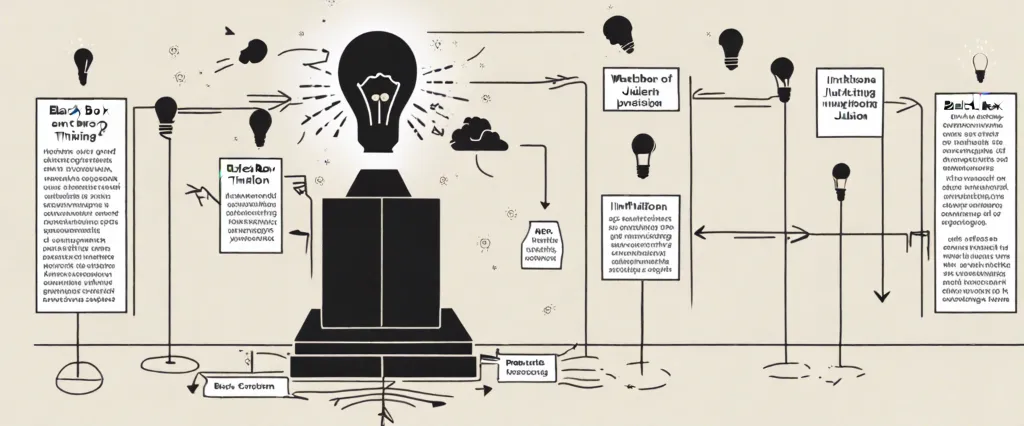
Every literary masterpiece has the power to transform our perspectives, challenge our belief systems, and provide profound insights into the intricate workings of the human mind. In this comparative study, we delve into two influential books that possess the ability to inspire personal growth and stimulate profound reflection on our own lives. “Black Box Thinking” by Matthew Syed and “The Four Agreements” by Don Miguel Ruiz, though seemingly distinct in their subject matter, both offer profound lessons about the relentless pursuit of improvement, overcoming self-limiting beliefs, and achieving personal transformation.
In his book, “Black Box Thinking,” Matthew Syed takes us on a captivating journey exploring the power of embracing failure and the importance of a growth mindset. Drawing parallels from airplane mishaps and medical errors to the triumphs of various industries, Syed presents a compelling case for reframing failure as a stepping stone toward success. In contrast, Don Miguel Ruiz’s “The Four Agreements” directs our focus towards the power of belief systems and their impact on our personal happiness and fulfillment. Through four fundamental principles, Ruiz provides insightful guidance for cultivating personal integrity, fostering harmonious relationships, and realizing our true potential.
Purpose:
The primary objective of this comparative study is to analyze the divergent yet complementary philosophical perspectives presented by Syed and Ruiz, shedding light on their shared underlying themes of personal development and self-realization. By critically examining the core principles and methodologies of “Black Box Thinking” and “The Four Agreements,” we aim to highlight the nuanced viewpoints and uncover the potential synergies that can enrich our understanding of human behavior and personal growth.
Methodology:
To accomplish our objective, we will employ a comparative analysis framework, utilizing a combination of close textual analysis, thematic synthesis, and critical evaluation of both books. By perusing and examining the central ideas, supporting arguments, and unique insights presented in each work, we will discern the intersections, contrasts, and overall impact of their respective philosophies. This exploration will be guided by the research question: How do the concepts of failure, growth, self-limiting beliefs, and personal transformation intertwine in “Black Box Thinking” and “The Four Agreements,” and what can we learn from their juxtaposition?
Significance:
By examining these two remarkable books side by side, we aim to deepen our understanding of how different perspectives on personal growth and self-improvement can influence our lives. Additionally, this comparative study serves as a valuable resource for individuals seeking insights into their own journeys of self-discovery and transformation. Furthermore, the findings of this study can act as a catalyst for the development of strategies and approaches that empower individuals and organizations to thrive in an ever-changing world.
Through the pages of “Black Box Thinking” and “The Four Agreements,” we embark on a quest for self-awareness, growth, and the realization of our full potential. Brace yourself for an enthralling exploration of these two literary treasures that have the potential to ignite a spark of transformation within us all.
Brief Summary of Two Books
Black Box Thinking by Matthew Syed
“Black Box Thinking” by Matthew Syed explores the concept of learning from failures and how it can lead to innovation and success. Syed draws parallels between industries such as aviation and healthcare, which have robust cultures of analyzing and learning from mistakes, and other sectors like politics and education, which tend to avoid accountability and repeat the same errors. The book argues that by adopting a “black box” mindset, where failures are seen as opportunities for improvement rather than sources of blame, individuals and organizations can reach new heights of achievement. Syed provides numerous case studies and examples, highlighting the importance of feedback, transparency, and a growth mindset in achieving progress and overcoming setbacks. Overall, “Black Box Thinking” encourages readers to embrace failure as a necessary part of the learning process and to develop a culture of continuous improvement.
The Four Agreements by Don Miguel Ruiz
The Four Agreements” by Don Miguel Ruiz is a self-help book that presents a practical guide for personal freedom and happiness through four foundational principles. Drawing on ancient Toltec wisdom, Ruiz outlines four agreements that individuals can make with themselves to transform their lives.
The first agreement is to be impeccable with your word, which emphasizes the power of language and the importance of speaking truth, avoiding gossip, and using words with positive intention. The second agreement is to not take anything personally. Ruiz explains that people’s actions and words are often a projection of their own beliefs and experiences, and by not internalizing others’ negativity, individuals can free themselves from unnecessary suffering.
The third agreement is to not make assumptions. Ruiz highlights the importance of seeking clarity and open communication, rather than assuming the thoughts, feelings, and intentions of others, which often leads to misunderstandings and conflicts. Finally, the fourth agreement is to always do your best. Rather than striving for perfection, Ruiz encourages individuals to give their best effort in every moment without judgment or self-criticism.
Throughout the book, Ruiz provides insights and examples to illustrate how incorporating these agreements into one’s life can lead to personal transformation, improved relationships, and overall happiness. He emphasizes the idea that these agreements, when practiced consistently, can liberate individuals from self-limiting beliefs, break free from fear and judgment, and help them live a more authentic and fulfilling life.
Comparison between Two Books

Similarities in Positive Thinking
Both “Black Box Thinking” by Matthew Syed and “The Four Agreements” by Don Miguel Ruiz emphasize the importance of positive thinking in order to achieve personal growth and success.
In “Black Box Thinking,” Syed explores the concept of embracing failure as a means to learn and improve. He argues that individuals should adopt a positive mindset when faced with failures or setbacks, as this allows them to analyze the “black box” of their mistakes and find ways to improve their performance. By viewing failure as an opportunity for growth and learning, Syed highlights the power of positive thinking in overcoming obstacles and achieving success.
Similarly, in “The Four Agreements,” Ruiz presents four principles or agreements that individuals can adopt to transform their lives. One of these agreements is to “be impeccable with your word,” which emphasizes the importance of thinking and speaking positively. Ruiz argues that our thoughts and words have a significant impact on our self-esteem and well-being. By choosing to think positively and speak kind and uplifting words, individuals can cultivate a more positive mindset, which in turn leads to more positive outcomes and experiences.
Therefore, both books acknowledge the power of positive thinking in navigating challenges and transforming one’s life. They emphasize that by adopting a positive mindset, individuals can approach failures and setbacks with resilience and learn from them, as well as create a more positive and fulfilling life through their thoughts and words.
Divergences in Positive Thinking
Black Box Thinking by Matthew Syed and The Four Agreements by Don Miguel Ruiz are two popular self-help books that offer valuable insights for personal growth and development. While there are similarities in terms of promoting improvement and self-awareness, there is a notable divergence in their perspectives on positive thinking.
In Black Box Thinking, Syed emphasizes the importance of embracing failure and learning from it. He argues that a growth mindset, which involves recognizing and admitting mistakes, is crucial for personal and professional success. Syed encourages readers to analyze failures with a curious and objective mindset, using them as stepping stones for improvement. Positive thinking, in this context, is not simply about blind optimism or denial of mistakes, but rather about embracing failure with an open and determined mindset to learn and grow.
On the other hand, The Four Agreements by Don Miguel Ruiz takes a slightly different approach to positive thinking. Ruiz proposes that one of the four agreements, “Be impeccable with your word,” encourages individuals to use positive language both within oneself and towards others. He suggests that by avoiding self-judgment and negative self-talk, individuals can cultivate a sense of self-worth and positive mindset. The book primarily focuses on building self-love and acceptance through positive thoughts and words, leading to healthier relationships and overall fulfillment.
The divergence in their perspectives on positive thinking lies in the balance between self-acceptance and self-improvement. While Syed’s approach in Black Box Thinking involves embracing failures and using them as tools for growth, Ruiz’s emphasis is more on self-love and positive thinking as a means to achieve personal happiness. Syed’s perspective recognizes the importance of learning from mistakes, while Ruiz’s approach suggests that positive thinking itself can lead to a fulfilling life.
Both approaches to positive thinking have their merits, and the choice between them depends on personal preferences and goals. Syed’s view may resonate more with individuals seeking continuous improvement and growth, while Ruiz’s approach may appeal to those prioritizing self-acceptance and positive emotional well-being. Nonetheless, both books provide valuable insights for personal development and serve as useful tools in navigating one’s journey to self-improvement.

Conclusion
Both “Black Box Thinking” by Matthew Syed and “The Four Agreements” by Don Miguel Ruiz are highly regarded books that offer valuable insights. The choice of which book is more worthy of reading ultimately depends on personal preferences and the specific areas you are interested in exploring.
“Black Box Thinking” delves into the concept of learning from mistakes and developing a growth mindset. Syed explores the importance of embracing failure and using it as an opportunity for growth and improvement, drawing examples from numerous industries. This book is particularly relevant for those interested in psychology, personal development, and understanding how successful individuals and organizations navigate challenges.
On the other hand, “The Four Agreements” presents ancient Toltec wisdom and offers guidance on personal freedom and self-transformation. Ruiz delves into four essential agreements that can help individuals achieve happiness, love, and authenticity. This book is particularly beneficial for those interested in spirituality, self-help, and improving their relationships with others and themselves.
Ultimately, both books offer unique perspectives and valuable insights. Consider your personal interests and the areas you seek to explore when deciding which one is more worthy of reading.



